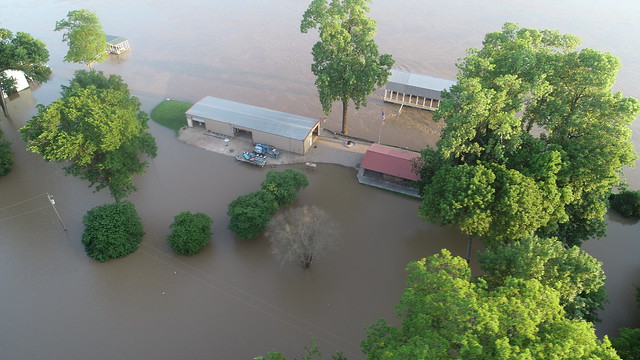Division of Agriculture offers resources for managing stress during disasters
By Fred Miller
U of A System Division of Agriculture
@AgNews479
June 14, 2019
Fast Facts:
- Residents of flooded areas should watch for signs of stress from “slow disaster”
- Children also affected, but often overlooked
- Division of Agriculture offers resources for dealing with stress
- Online resources at https://www.uaex.uada.edu/life-skills-wellness/personal-family-well-being/personal/managing-stress.aspx
(655 words)
(Newsrooms: With additional art at https://flic.kr/s/aHsmDKidYd)
(Download this story in MS Word format here.)
FAYETTEVILLE, Ark. — Farmers and communities inundated by flooding along the Arkansas River have to cope with more than water damage and ruined or delayed crops. The stress of facing such massive loss may take as big a toll on mental health as it does on property.
“Disasters pile stress on top of loss and physical danger,” said Brittney Schrick, extension family life specialist and assistant professor of family and consumer science for the University of Arkansas System Division of Agriculture. “The flooding in the state is especially hard,” she said, “because it’s a disaster happening in slow motion.”
Arkansans on farms and in cities and towns along the Arkansas River have had to endure a sense of vulnerability as they watched the river levels rise for days, inundate their property and neighborhoods, and then recede, leaving behind mud, ruined homes and property as the surge moved on to downstream communities.
The stress may be hidden by the tasks of preparing for disaster, Schrick said, but the anxieties are building, often manifesting as feelings of powerlessness to avoid the danger.
Disaster-related stress manifests differently in everyone but individuals can watch for signs in themselves, their families and neighbors.
“People often feel physical symptoms like stomachaches, headaches and heart palpitations,” she said. “They may experience anxiety they can’t relieve because they feel powerless to do anything.”
Signs of stress
Stress can manifest in excessive activity by those who are trying to keep busy in order to avoid dealing with stress.
“People may notice mood changes in family members,” Schrick said. “People don’t act like themselves, expressing unusual emotions like negativity, anger or lethargy.”
Other signs of stress include irritation, restlessness, and difficulty sleeping or relaxing. “These are especially common when people are displaced by floods and living in unfamiliar or uncomfortable surroundings,” she said.
The stress can affect relationships too. People may take out anger or emotional outbursts on family members or close friends. Still others may behave in the opposite manner, becoming withdrawn and closed off to others.
Stress affects children, too
Children also experience stress during disasters, Schrick said, but the signs are often overlooked, or the signs are different from adults.
“Parents are often more concerned about protecting their children from the physical dangers of floods,” she said. “They may experience stomach aches or headaches that could be mistaken as common childhood ailments.”
Children may also experience anger and emotional outbursts.
“They may be upset for unclear reasons, and unless adults are aware of these and watching for the signs, stress may go unnoticed in children,” Schrick said. “Parents also might not know how to deal with these.”
Parents should be careful to filter media coverage of flooding, as well as their own behavior regarding the disaster. The constant onslaught of information and preoccupation with flooding can compound stress for both children and adults. Redirecting attention to other things can help them to cope with stress.
Resources for dealing with stress
The Division of Agriculture is among the places with resources that can help people manage stress during disaster, and are as close as the county extension office.
“All family and consumer science agents in the county offices have access to resources that can help their communities,” Schrick said.
Resources include one-hour education programs for managing stress, generally, and for managing farm stress are available on request from county extension offices. The extension service is currently working to build additional resources on recognizing symptoms and helping families deal with the stresses of displacement. The resources also include dealing with the physical damage such as cleaning up flood damage and knowing what’s safe to keep.
Other resources for stress management may include a workplace employee assistance program.
To learn about Extension Programs for managing stress in Arkansas, contact your local Cooperative Extension Service agent or visit www.uaex.uada.edu. Follow us on Twitter at @AR_Extension.
The Division of Agriculture also has stress management resources available online: https://www.uaex.uada.edu/life-skills-wellness/personal-family-well-being/personal/managing-stress.aspx.
About the Division of Agriculture
The University of Arkansas System Division of Agriculture’s mission is to strengthen agriculture, communities, and families by connecting trusted research to the adoption of best practices. Through the Agricultural Experiment Station and the Cooperative Extension Service, the Division of Agriculture conducts research and extension work within the nation’s historic land grant education system.
The Division of Agriculture is one of 20 entities within the University of Arkansas System. It has offices in all 75 counties in Arkansas and faculty on five system campuses.
Pursuant to 7 CFR § 15.3, the University of Arkansas System Division of Agriculture offers all its Extension and Research programs and services (including employment) without regard to race, color, sex, national origin, religion, age, disability, marital or veteran status, genetic information, sexual preference, pregnancy or any other legally protected status, and is an equal opportunity institution.
# # #
Media Contact: Mary Hightower
Dir. of Communication Services
U of A System Division of Agriculture
Cooperative Extension Service
(501) 671-2126
mhightower@uada.edu
